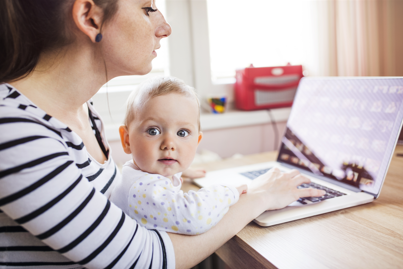When it comes to having children, there are many elements that workers need to consider first, including the time they may want to (and can afford to) take off and potential childcare costs - and that’s before the baby’s even here!
Luckily, lots of countries’ governments have family-friendly policies in place, allowing new parents to take time off to be with their babies in those all-important initial weeks. But which country’s residents get the best offering when it comes to maternity and paternity leave and pay? We compared key data for 31 countries across the globe to find out more.
In addition to this, we wanted to find out Brits’ opinions on the UK’s current Statutory Maternity, Paternity and Adoption Leave packages – do people think they’re good enough? We surveyed 2,000 UK adults to see if they were satisfied with the policies and pay offered to working parents, or if they'd want to trade in any of their existing benefits to get a sweeter deal.
Read on to find out more...
Where is best for working parents?

Looking at 31 countries’ current maternity and paternity offerings, we sought to find out where in the world working parents get the best experience while raising their newborns. Creating a ranking system, we examined the following from each country:
- The number of weeks available for both Maternity and Paternity Leave (SML/PML)
- Whether the time off is paid (and/or what % is paid)
- Whether there was a separate Parental Leave Package available for new parents
- If this was separate to Statutory Maternity and Paternity Leave
- Average cost of rent for a three-bedroom property in GBP
- Average cost of basic utilities in GBP
- Average cost of childcare (private nursery) monthly in GBP
Sweden comes out on top

Securing first place in our rankings was Sweden. Here they do not offer Maternity or Paternity Leave and instead opt for a Shared Parental Leave policy that is set at 240 days (or 34 weeks) per parent, giving new families a total of 480 days leave to spend with their new-born baby.
Another aspect putting Sweden at the top of the list is their comparatively low childcare costs, with private nurseries setting a family back £106.83 per month. In addition to this, the average rent for a three-bedroom coming out at £810.93 per month, whilst basic utilities come to an average of £64.47. With an average salary of £2301.55 (after tax), these bills account for 42% of a Swedish resident’s take-home pay (if they’re not splitting the bills with anyone else).
Following closely in the rankings are Bulgaria, Hungary, Finland and Romania.
Top 10 Countries for Working Parents:
1 Sweden
2 Bulgaria
3 Hungary
4 Finland
5 Romania
6 Lithuania
7 Estonia
8 Croatia
9 Czechia
10 Poland
Bulgaria placed second in our rankings. The country offers 60 weeks of Maternity Leave and a further 104 available weeks of Shared Parental Leave that parents can take until their child turns two. With a lower cost of living too - the average rent costs £373.98 per month - it’s easy to see why Bulgaria has featured so near the top of the list.
Placing third, Hungary’s SML (Statutory Maternity Leave) policy offers 24 weeks to new mothers, and after this time, one parent can take further Parental Leave (a total of 84 weeks available) at 70% of their pay - although this is capped at double the country’s minimum wage.
Finland offers 17 weeks of maternity leave to new mothers, which is a lower amount than the other top countries. However, new fathers can take nine weeks of Paternity Leave, with an overall total of 45.7 weeks of leave available between parents, pulling the country up to the fourth spot.
Compared to other countries in the top positions, the cost of living runs higher in Finland with rent coming to £804.58 on average per month and utilities coming in at £98.71 making it a more costly option for expecting parents.
At number five is Romania, which offers residents 18 weeks of Maternity Leave with an overall 104 weeks available when looking at Shared Parental Policies. This, paired with lower costs of living (the average price of rent is £357.73, with utilities coming in at £100.49) means that Romania rounds off our top five list.
What are the ‘worst’ countries for working parents?
On the other end of the spectrum, the small European country of Luxembourg was found to top the bottom five list.

The country currently offers just 20 days of Statutory Maternity Leave (SML) to new mothers and does not have any Statutory Paternity Leave policy in place. This, alongside a high cost of living for residents (with the average rent coming to £1,880.86 and basic utilities costing £222.21 on average), meant that Luxembourg takes the bottom spot in our table.
The USA, Germany, Austria, Belgium and Denmark joined Luxembourg in the bottom five.
In the USA, there is currently no policy on Maternity or Paternity Leave for new parents. Under the Family Medical Leave Act, employees can take 12 weeks off for their new child, but these are all unpaid. The cost of living is also on the higher end of the scale, with the average rent totalling £1,804.83 per month, plus utility bills at £143.88.
Despite offering a huge 313 available weeks (that’s a whopping three years!) of Shared Parental Leave, Germany came low in the rankings due to the high cost of living – with utilities and rental prices coming to £1,245.20 each month.
Austria’s policies allow new mothers to take 16 weeks of paid Maternity Leave, and fathers are also able to take 4 weeks off, however Paternity Leave is unpaid in the country. Residents may choose to take Parental Leave any time before their child reaches the age of two, however the minimum period of Parental Leave is two months during which your salary will be suspended.
New mothers in Belgium can take just 15 paid weeks off for their Maternity Leave The average rent for a family of three comes to £809.49, with utilities adding on another £142.41.
Denmark also came in low in the rankings despite a more generous maternity allowance, with the country offering 20 weeks of Maternity Leave paid up to 599 euros (or £508.07) per week, based on an individual’s former earnings.
New fathers can also take two weeks off at this level of pay and residents of Denmark can also take 32 weeks shared Parental Leave to enjoy time with their baby. However, when taking into account the cost of living for new families (with the average three bed rental costing £1,130.19, plus utilities of £151.73 and private childcare coming to £358.86 per month) Denmark came out as a pricey option in comparison to many other places.
Private childcare costs differ greatly around the world, with some countries such as the Netherlands paying as much as £1326.26 every month to send their child to a private nursery. On the other end of the spectrum, new parents in Croatia were found to be forking out the least on private childcare, with their monthly costs coming to £104.79.
| Country | Avg cost of childcare (private nursery) monthly (£) |
|---|---|
| Australia | 1113.64 |
| Austria | 27.26 |
| Belgium | 461.75 |
| Bulgaria | 276.55 |
| Canada | 703.89 |
| Croatia | 104.79 |
| Cyprus | 289.06 |
| Czechia | 329.1 |
| Denmark | 358.86 |
| Estonia | 161.35 |
| Finland | 264.86 |
| France | 528.28 |
| Germany | 281.01 |
| Greece | 273.8 |
| Hungary | 209.5 |
| Ireland | 807.03 |
| Italy | 381.98 |
| Latvia | 266.57 |
| Lithuania | 333.20 |
| Luxembourg | 1036.26 |
| Malta | 316.52 |
| Netherlands | 1326.26 |
| Poland | 210.98 |
| Portugal | 283.45 |
| Romania | 295.94 |
| Slovakia | 327.78 |
| Slovenia | 335.86 |
| Spain | 304.70 |
| Sweden | 106.83 |
| UK | 969.57 |
| USA | 862.98 |
How does the UK compare?
When looking at the UK in the rankings, unfortunately we have not come out on top, with the country narrowly missing out on the bottom five list.
The UK’s current Statutory Maternity Leave (SML) is 52 weeks, this is made up of 26 weeks ordinary maternity Leave, and 26 additional weeks of maternity allowance1.
You receive Statutory Maternity Pay (SMP) for up to 39 weeks of your leave, this consists of:
• 90% of your average weekly earnings (before tax) for the first 6 weeks
• £156.66 or 90% of your average weekly earnings (whichever is lower) for the next 33 weeks
In comparison, expecting dads can take up to two weeks Statutory Paternity Leave (SPL), which is paid at a rate of £156.66, or 90% of your average weekly earnings (whichever is lower).
However, Shared Parental Leave is available to new parents, allowing dad to take some more time off, and you can receive pay for the first 39 weeks of this. For example, a new mother could take 22 weeks of Maternity Leave and SMP, and then share 30 weeks of Shared Parental Leave and 17 weeks of Shared Parental Pay with their partner.
These available weeks of leave resulted in the UK ranking highly in our table, however the high cost of living meant we were pulled down in the overall rankings, and unfortunately means that parents may struggle and be forced to return to work earlier than they’d like.
In the UK, the average rent for a three-bed comes to a huge £1,713 each month, additionally utilities add £169.55 to Brits outgoings each month leaving little room for other spending. Those that opt to send their children to private nursery will also find themselves spending £969.57 each month on this expense.
The UK’s maternity and paternity policies leave a lot to be desired, according to Brits

Despite a relatively high amount of leave available, Brits aren’t too impressed with the UK’s current offerings.
We asked 2,000 UK adults for their view on the country’s current Statutory Maternity and Paternity Leave policies and found that they leave a lot to be desired with Brits as a third (31%) believe that the current SMP is “less than adequate”.
Almost ten percent more women than men (35% vs 28%) stated that they do not believe the Statutory Maternity Leave offering in the UK is not good enough.
When asked about the Statutory Paternity Leave policy, which allows partners to take one or two weeks leave, almost half of Brits (47%) think that this current offering is not good enough for new fathers.
Currently, the UK’s Statutory Adoption Leave allows those adopting a child to enjoy up to 52 weeks off work, with some pay for 39 weeks – which is almost identical to that offered as part of the UK’s Maternity Leave package.
However, despite these policies being very similar, when looking at the policies in place for Statutory Adoption Leave (SAL), we take a more favorable view, as just over a third deemed the leave and pay rates for SAL to be adequate. In comparison, just over a fifth of Brits (22%) stated that the offerings for adoptive parents were inadequate.
When it comes to Shared Parental Leave in the UK, a policy that allows parents to share up to 50 weeks of leave and 37 weeks of pay between them in the first year after their child is born, six in ten (61%) state that they’re satisfied with the offerings we currently have in place.
What would we give up for more maternity or paternity leave?
We also asked Brits about which work perks they’d be willing to give up or compromise on in order to get more generous maternity, paternity, or adoption leave package. Our survey found that many of us were reluctant to the idea of swapping anything to access a better package.
Seven in ten (69%) stated that they would rather have a competitive salary than an enhanced maternity, paternity, or adoption leave policy in their job.
Although, this isn’t the case for everyone. In fact, men were more likely to value an enhanced maternity or paternity package with over a third (37%) stating that they would rather be offered this than a higher salary (versus 26% of women).
When it comes to our priorities at work, a company car and private healthcare were found to be more valued for the majority (66%) of Brits. Just under a third (31%) would prefer that their company offered an enhanced paternity or maternity package in place of a competitive annual leave allowance.
And two thirds (64%) of UK adults would even value company away days in higher regard.
Less than a quarter of those surveyed (22%) stated that their current company already offers a substantial number of employee perks and benefits to them, in addition to an enhanced maternity or paternity package.

Conclusion
It’s clear to see that not all countries are built equally when it comes to their government’s policies on maternity and paternity leave, with some places offering no official policies at all versus others that allow new parents to take over a year off to be with their child.
And when you look at the variables such as shared parental leave, the cost of living and childcare in each country, it’s obvious that some new parents may be better off than others.
For those of us looking at starting a family, it may be appealing to head elsewhere and get the most bang for your buck, but any expats should look into their chosen country’s policy closely before making the big move. There may be specific conditions employees have to meet before they can gain access to those maternity or paternity leave benefits, so it’s worth doing your research before you take the leap!
That said, for anyone who’s thinking of moving further afield to start their family, before you head off, remember to update your business cards and any workplace stationery to reflect your change of address, and to make sure everyone can keep in touch.
We at instantprint want to say congratulations on your new adventure (whether that’s moving abroad or having a little one)!
Why not print any goodbye cards, or invitations to farewell parties with us: https://www.instantprint.co.uk/cards-and-invites
Inspiration for new business cards can be found here: https://www.instantprint.co.uk/business-cards
And, for all your business stationery needs visit: https://www.instantprint.co.uk/business-stationery
Sources:
Numbeo was used for cost of rent, utilities and childcare, and average salaries
1 https://www.gov.uk/maternity-pay-leave/leave
Sources for Rankings
• Australia
o https://www.fairwork.gov.au/leave/maternity-and-parental-leave/paid-parental-leaveEmployees can get Parental Leave Pay (PLP) from the Australian Government and paid parental leave from their employer."
• Austria
o https://www.migration.gv.at/en/living-and-working-in-austria/working/leave-annual-leave-parental-leave-etc/#:~:text=Mothers%20and%20fathers%20are%20entitled,parental%20leave%20is%20two%20months.
• Belgium
o https://www.expatica.com/be/healthcare/womens-health/having-a-baby-in-belgium-100241/#maternity
o https://www.thevillage.be/admin-rights/types-of-leave/parental-leave/"
• Bulgaria
o https://www.angloinfo.com/how-to/bulgaria/healthcare/pregnancy-birth/maternity-leave
• Canada
o https://www.canada.ca/en/services/benefits/ei/ei-maternity-parental.html
• Croatia
o chrome-extension://efaidnbmnnnibpcajpcglclefindmkaj/https://www.leavenetwork.org/fileadmin/user_upload/k_leavenetwork/country_notes/2017/Croatia_2017_final_corrected.pdf
• Cyprus
o chrome-extension://efaidnbmnnnibpcajpcglclefindmkaj/https://www.leavenetwork.org/fileadmin/user_upload/k_leavenetwork/country_notes/2020/PMedited.Cyprus.with_supplement.31aug2020.pdf
• Czechia
o https://www.expats.cz/czech-news/article/maternity-leave-in-the-czech-republic
• Denmark
o https://www.oresunddirekt.se/en/working-in-denmark/family-and-parenting/parental-leave-when-working-in-denmark#:~:text=Length%20of%20parental%20leave%20in,weeks%20of%20leave%20after%20birth.
• Estonia
o https://medium.com/@kristelkruustuk/maternity-leave-is-it-really-abnormally-long-in-estonia-13c9314e3e05
• Finland
o https://www.kela.fi/web/en/maternity-allowance
• France
o https://www.theguardian.com/world/2020/sep/23/france-doubles-paid-paternity-leave-to-28-days
• Germany
o https://handbookgermany.de/en/parental-leave#:~:text=Each%20parent%20can%20take%20up,mother%20has%20to%20stay%20home.
• Greece
o chrome-extension://efaidnbmnnnibpcajpcglclefindmkaj/https://www.leavenetwork.org/fileadmin/user_upload/k_leavenetwork/country_notes/2020/PMedited.Greece.with_supplement.31aug2020.pdf
• Hungary
o https://www.papayaglobal.com/countrypedia/country/hungary/#:~:text=Parental%20Leave&text=This%20leave%20is%20paid%20at,working%20days%20for%20two%20children
• Ireland
o https://www.citizensinformation.ie/en/employment/employment_rights_and_conditions/leave_and_holidays/parental_leave.html
• Italy
o https://ec.europa.eu/social/main.jsp?catId=1116&langId=en&intPageId=4618
• Latvia
o chrome-extension://efaidnbmnnnibpcajpcglclefindmkaj/https://www.leavenetwork.org/fileadmin/user_upload/k_leavenetwork/country_notes/2018/FINAL.Latvia2018.pdf
• Lithuania
o https://boundlesshq.com/guides/lithuania/leave/
• Luxembourg
o https://www.justarrived.lu/en/kids-and-family/conge-maternite-et-parental/
• Malta
o https://gvzh.mt/insights/paternity-leave-in-malta-is-change-around-the-corner/#:~:text=Under%20Maltese%20law%2C%20a%20pregnant,are%20paid%20by%20the%20Government.
• Netherlands
o https://ec.europa.eu/social/main.jsp?catId=1122&langId=en&intPageId=4987#:~:text=You%20have%20the%20right%20to%20at%20least%2010%20weeks'%20maternity,extended%20for%20a%20multiple%20birth
• Poland
o https://ec.europa.eu/social/main.jsp?catId=1124&langId=en&intPageId=4719
• Portugal
o https://www.expatica.com/pt/healthcare/womens-health/having-a-baby-in-portugal-105360/#:~:text=for%20more%20information.-,Parental%20leave%20in%20Portugal,(six%20weeks)%20after%20birth.
• Romania
o https://ec.europa.eu/social/main.jsp?catId=1126&intPageId=4746&langId=en#:~:text=This%20period%20is%20made%20up,child%20is%20born%20are%20compulsory
o https://www.globalization-partners.com/globalpedia/romania-employer-of-record/#Maternity-Paternity-Leave-in-Romania
• Slovakia
o https://www.slovensko.sk/en/life-situation/life-situation/_maternity-leave-and-parental-l#:~:text=In%20connection%20with%20the%20childbirth,maternity%20leave%20for%2043%20weeks.
o https://www.euraxess.sk/en/main/info/working/employment/maternity-leave-family-care
• Slovenia
o https://ec.europa.eu/social/main.jsp?catId=1128&langId=en&intPageId=4775#:~:text=Each%20of%20the%20parents%20is,parent%20or%20guardian%2Ffoster%20parent.
• Spain
o https://www.expatica.com/es/working/employment-law/maternity-leave-spain-105033/
o https://www.safeguardglobal.com/resources/blog/paternity-leave-in-spain
• Sweden
o https://ec.europa.eu/social/main.jsp?catId=1130&intPageId=4808&langId=en#:~:text=Parental%20benefit%20is%20240%20days,been%20taken%20for%20the%20child.
• UK
o https://www.gov.uk/parental-leave/entitlement#:~:text=Parental%20leave%20is%20unpaid.,unless%20the%20employer%20agrees%20otherwise).
o https://www.gov.uk/employers-maternity-pay-leave
• USA
o https://www.footholdamerica.com/faqs/how-long-for-us-maternity-leave/#:~:text=However%2C%20the%20Family%20Medical%20Leave,no%20requirement%20to%20provide%20pay.





